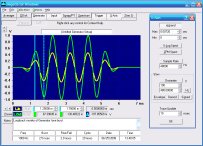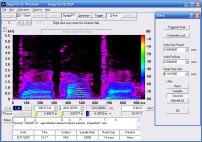![[LogoShip]](logo5.png)
Software for Windows
Science with your Sound Card!


Features:
Oscilloscope
Spectrum Analyzer
8-Channel
Signal Generator
(Absolutely FREE!)
Spectrogram
Pitch Tracker
Pitch-to-MIDI
DaqMusiq Generator
(Free Music... Forever!)
Engine Simulator
LCR Meter
Remote Operation
DC Measurements
True RMS Voltmeter
Sound Level Meter
Frequency Counter
Period
Event
Spectral Event
Temperature
Pressure
MHz Frequencies
Data Logger
Waveform Averager
Histogram
Post-Stimulus Time
Histogram (PSTH)
THD Meter
IMD Meter
Precision Phase Meter
Pulse Meter
Macro System
Multi-Trace Arrays
Trigger Controls
Auto-Calibration
Spectral Peak Track
Spectrum Limit Testing
Direct-to-Disk Recording
Accessibility
Data Logger
Waveform Averager
Histogram
Post-Stimulus Time
Histogram (PSTH)
THD Meter
IMD Meter
Precision Phase Meter
Pulse Meter
Macro System
Multi-Trace Arrays
Trigger Controls
Auto-Calibration
Spectral Peak Track
Spectrum Limit Testing
Direct-to-Disk Recording
Accessibility
Applications:
Frequency response
Distortion measurement
Speech and music
Microphone calibration
Loudspeaker test
Auditory phenomena
Musical instrument tuning
Animal sound
Evoked potentials
Rotating machinery
Automotive
Product test
Contact us about
your application!
Custom Scale Definition
Controls: Sgram/PT Dialog >> Pitch-to-MIDI >> Setup >> Scale
Changes: Sv="string12"
If you can't find the scale you want in the Scale List, you can create your own using the same format. Up to 4 custom scales are supported.
The Custom Scale definitions all default to the equivalent of Chromatic... all notes are accepted. The default definition is thus CdDeEFgGaAbB. Any notes that you don't want to include in the custom scale should be replaced with spaces or periods to act as placeholders. (Minus signs or underscores will also work.)
Important: This format uses position to determine the scale notes, not the specific letters you enter. Any alphanumeric character is regarded as a scale note at its position.
Although all the standard scales in the scale list have 'C' set, this is not a requirement of custom scales (nor of scales you set via MIDI Changes script).
When you enter a new scale pattern, the Num field shows the equivalent 12-bit number.
Alternatively, you can specify the custom scale as a 12-bit number (1 to 4095) in the Num field, and the pattern field will be updated correspondingly.
You can give your scale a meaningful name using the Custom Scale Name field. When you click on the button between the Definition and Name fields, that scale becomes the selected scale. The Scale button in the Voice Setup dialog will show the custom name. If the prior scale was a Scale List selection, the highlight will be removed from that list entry.
There is no special Changes script command for custom scales; essentially, every Changes scale is "custom" since it is completely determined by the string you enter.
Use Sv="string12" to set the Scale for MIDI Voice v to the string "string12". The string must be enclosed in quotes as shown, and must be 12 characters long. For example, S2="CdDeEFgGaAbB" sets Voice 2 to use a Chromatic (all notes) scale.
Alternatively, you can create computed or random scales via Sv=n, which sets the Scale for voice v according to the bits set in value n, which may be any valid expression. Only the low 12 bits are used. Bit 11 (most-significant) represents C in the scale, and bit 0 represents B. If a bit is set, the corresponding note is included in the scale.
You can select one of the Custom scales at random using the Siv=n format to select by index instead of by value. Index values from 0-531 are those scales in the List box, while 532-535 are the four Custom scales. For example, Si2=?(532,535) randomly selects one of the Custom scales for Voice 2.
See also MIDI Voice Scale, MIDI Voice Setup Dialogs, Pitch-to-MIDI dialog, Pitch Track Toolbox - Overview
- Back to Musical Scales List
- Ahead to Custom Scale Select
- Daqarta Help Contents
- Daqarta Help Index
- Daqarta Downloads
- Daqarta Home Page
- Purchase Daqarta
Questions? Comments? Contact us!
We respond to ALL inquiries, typically within 24 hrs.INTERSTELLAR RESEARCH:
Over 35 Years of Innovative Instrumentation
© Copyright 2007 - 2023 by Interstellar Research
All rights reserved